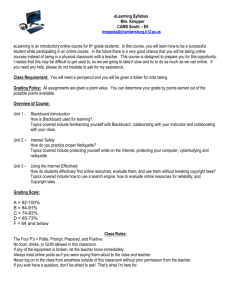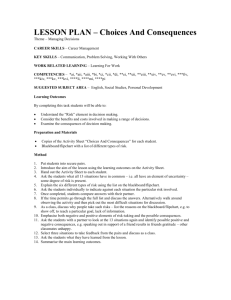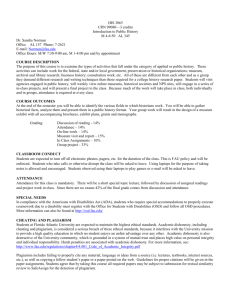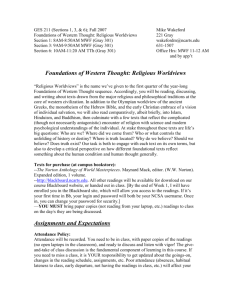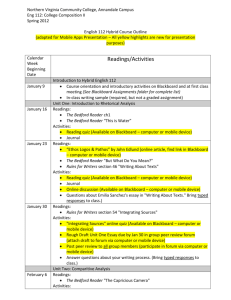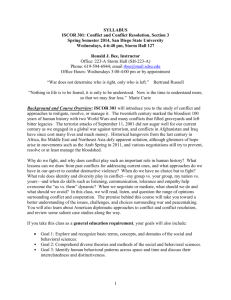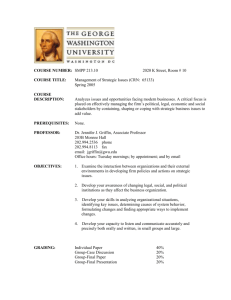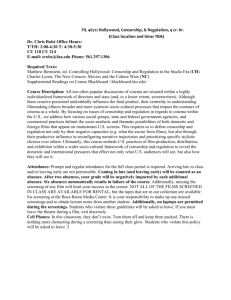Syllabus
advertisement
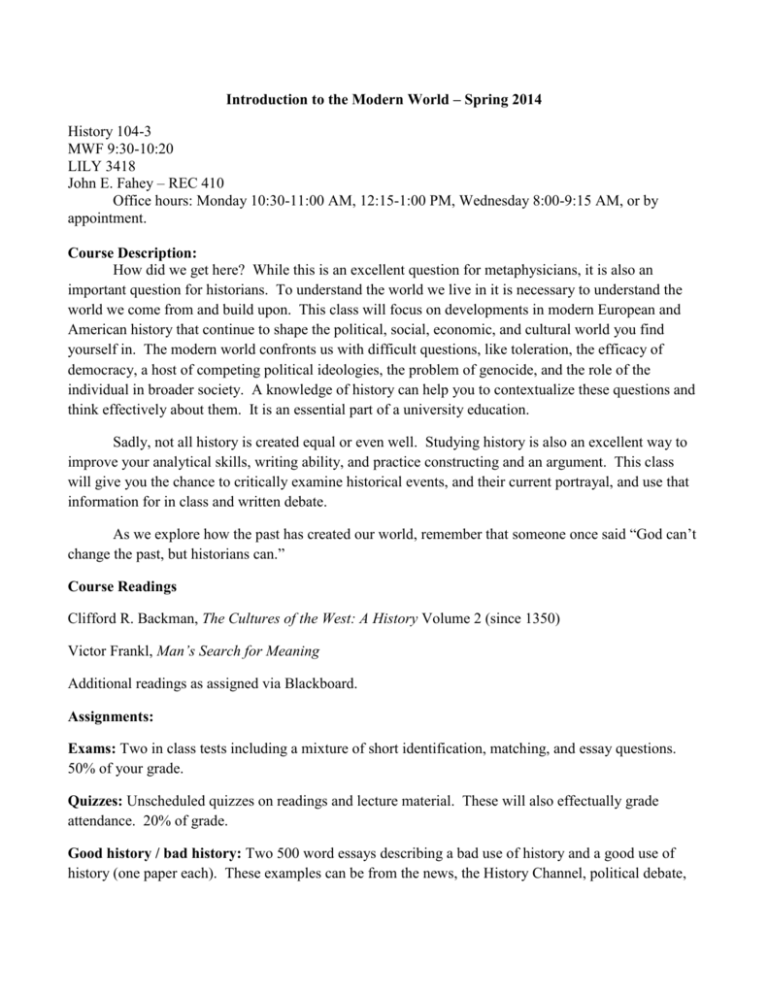
Introduction to the Modern World – Spring 2014 History 104-3 MWF 9:30-10:20 LILY 3418 John E. Fahey – REC 410 Office hours: Monday 10:30-11:00 AM, 12:15-1:00 PM, Wednesday 8:00-9:15 AM, or by appointment. Course Description: How did we get here? While this is an excellent question for metaphysicians, it is also an important question for historians. To understand the world we live in it is necessary to understand the world we come from and build upon. This class will focus on developments in modern European and American history that continue to shape the political, social, economic, and cultural world you find yourself in. The modern world confronts us with difficult questions, like toleration, the efficacy of democracy, a host of competing political ideologies, the problem of genocide, and the role of the individual in broader society. A knowledge of history can help you to contextualize these questions and think effectively about them. It is an essential part of a university education. Sadly, not all history is created equal or even well. Studying history is also an excellent way to improve your analytical skills, writing ability, and practice constructing and an argument. This class will give you the chance to critically examine historical events, and their current portrayal, and use that information for in class and written debate. As we explore how the past has created our world, remember that someone once said “God can’t change the past, but historians can.” Course Readings Clifford R. Backman, The Cultures of the West: A History Volume 2 (since 1350) Victor Frankl, Man’s Search for Meaning Additional readings as assigned via Blackboard. Assignments: Exams: Two in class tests including a mixture of short identification, matching, and essay questions. 50% of your grade. Quizzes: Unscheduled quizzes on readings and lecture material. These will also effectually grade attendance. 20% of grade. Good history / bad history: Two 500 word essays describing a bad use of history and a good use of history (one paper each). These examples can be from the news, the History Channel, political debate, popular culture, or elsewhere and can be turned in at any time during the semester. Further instructions and examples are on Blackboard. 10% of grade. Essay: Five page essay evaluating historical arguments and a primary source. 20%. Course Policies: Attendance: Attendance is highly encouraged, but will not be tracked. Quizzes will be given in class at random and can not be made up, unless approved of beforehand. Extra credit can be earned by participating in class discussions. Running grades will be kept on Blackboard. Campus closures: In case of a major campus emergency or closure, students will be informed of changes to class schedule and requirements by e-mail, Blackboard and class announcements. Plagiarism: Plagiarism refers to the reproduction of another author’s words/ideas without proper attribution. University regulations do not tolerate acts of plagiarism, cheating, or other academic dishonesty. Any acts of academic dishonesty will likely result in a failing grade and referral to the Dean of Students. Course Schedule Reading Assignment Week 373-388 1 1 1 20 Martin Luther King, Jr. (No class) 22 The Protestant Reformation 24 Wars of Religion 388-402 441-459 2 2 2 27 Absolutism 29 Scientific Revolution 31 Enlightenment 503-526 465-474, 491-499 553-562, 565-573 3 3 3 591-601 Blackboard readings 4 4 4 10 Napoleonic Wars 12 Metternich Era 14 Liberalism and Marxism 601-620 665-677 677-685, 687-691 5 5 5 17 Industrialization and Romanticism 19 Revolutions of 1848 21 Nationalism, German and Italian Unification 625-639, 645-661 685-687, blackboard readings 705-729 6 6 6 January 13 Introduction & What is history 15 Europe 1350 C.E. 17 The Renaissance February 3 French Revolution 5 Global Revolutions 7 No class – French Revolution assignment Course Schedule Reading Assignment 24 Eastern Crisis and Great Game 26 Family Life and Women’s rights 28 Midterm Week Blackboard readings 783-807 7 7 7 815-819, 826-836 819-826, 849-859 745-749, 752-772 8 8 8 860-864, 869-880 887-896 901-912, 921-928 9 9 9 24 Russian Revolution 26 Peace and new states 28 Interwar culture and the depression 912-921, blackboard readings 931-941 941-955 10 10 10 31 Stalinism and Soviet society April 2 Fascist Movements 4 Road to World War II and blitzkrieg 964-966, blackboard readings 955-964, 966-969 969-983 11 11 11 7 Total war, society, and war’s end 9 Holocaust and Genocide Essay due 11 Post-war Reconstruction and aftermaths 993-1014 987-993, Man’s Search for Meaning 1017-1023, 1057-1074 12 12 14 Cold War 16 The 60s 18 Decolonization 1023-1026, 1029-1035 13 1035-1054 13 1026-1029, blackboard readings 13 21 Late Communism and Fall of Soviet Union 23 End of History and the European Union 25 Globalization and the flat world 1091-1104, blackboard readings 14 1104-1109 14 1111-1113, blackboard readings 14 March 3 New Imperialism 5 New sciences 7 Evolution and God 10 Modernism and nihilism 12 Road to Sarajevo 14 World War I (tactics/home front/ cultural impact) 17-21 No class - Spring Break 28 9-11 and the War on Terror 30 Technological, social, and cultural fracture May 2 Financial Crises, etc. 1125-1142 Blackboard readings 1142-1156 5 May Final Exam Week – final exam schedule to be announced when available. 12 15 15 15



